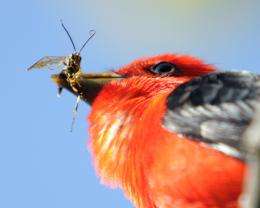Study Affirms Importance of Insect-Eating Animals to Ecosystem Health

(PhysOrg.com) -- Lions, tigers and bears top the ecological pyramid-the diagram of the food chain that every school child knows. They eat smaller animals, feeding on energy that flows up from the base where plants convert sunlight into carbohydrates.
A new study published in in the April 5, 2010 early edition of the Proceedings of the National Academy of Sciences examines complex interactions in the middle of the pyramid, where birds, bats and lizards consume insects, and shows that these predators eat enough insects to indirectly benefit plants and increase their growth. Daniel Gruner, University of Maryland Department of Entomology, who co-authored the study along with Kailen A. Mooney, University of California, Irvine, and scientists from the Smithsonian Institution, the University of Missouri, and the University of Toledo, explains, "This study solidifies the importance of birds, bats, lizards and other similar animals to ecosystem health, and underscores the importance of conserving these species in the face of global change."
Previous theory on food webs suggested that the effects of insect-eaters on plants would be weak, because animals like birds not only feed on herbivores - which is good for the plants - but may also benefit herbivores by feeding on spiders and predatory insects. If a bird eats many spiders, for example, caterpillars could be "released" from spider predation to then consume more plant material. The authors found that previous theory did not hold true; in fact, the birds simply ate the spiders and the caterpillars. "Our study shows that despite feeding on predatory insects, birds, bats and lizards still act as plant protectors by having net negative effects on plant-feeding insects," says Gruner.
The authors reviewed more than 100 studies of insect predation by birds, bats or lizards from four continents. They found that the identity of the predator didn't make much of a difference. Together, by eating herbivores and their insect predators, they reduced damage to plants by 40 percent, which resulted in a 14 percent increase in plant biomass.
"Our findings are relevant to natural communities like grasslands and forests, but also to human food production, as these insect-eating animals also reduce insect pests on crop plants," said Sunshine Van Bael, scientist at the Smithsonian Tropical Research Institute.
"It's no longer apt to say that one 'eats like a bird'," said Van Bael, "Our study shows that birds, bats and lizards act as one big vacuum cleaner up in the treetops. Everything's on the menu."
The role these animals play could be at risk though. As ecosystems are fragmented and altered, large-bodied predators (such as tigers and eagles) but also specialized insectivores, particularly in the tropics, are among the first species to disappear. Lost with them are their ecosystem functions, such as predation in this case. "Deer overpopulation and outbreaks of insect pests are several examples that may be explained generally by the loss of predator function in ecosystems," explains Gruner.
This study adds to growing evidence from diverse ecosystems including lakes, oceans, streams, grasslands, and now forests that predators can be vital to plant communities through their indirect effects. "Our synthesis would not have been possible without many individual researchers running replicated, long-term field studies," says Gruner. "We owe a debt of gratitude to the hard work and incremental advances of these ecologists all over the globe."
Co-authors of this study include researchers from the University of California, Irvine, the University of Maryland, the University of Missouri-St. Louis, the University of Toledo, and the Smithsonian's Migratory Bird Center at the National Zoological Park.
More information: Kailen Mooney, Daniel Gruner, Nicholas Barber, Sunshine Van Bael, Stacy Philpott and Russell Greenberg. 2010. Interactions among predators and the cascading effects of vertebrate insectivores on arthropod communities and plants. Proceedings of the National Academy of Sciences www.pnas.org/doi/10.1073/pnas.1001934107
Provided by University of Maryland


















